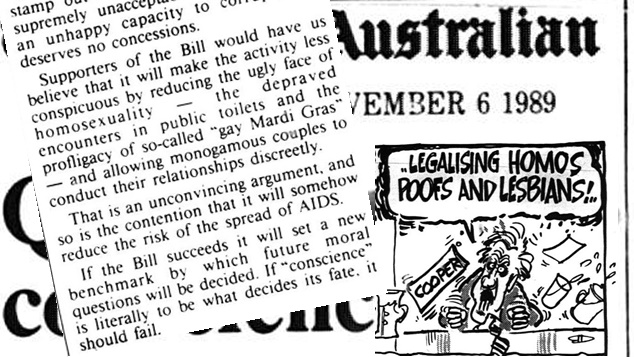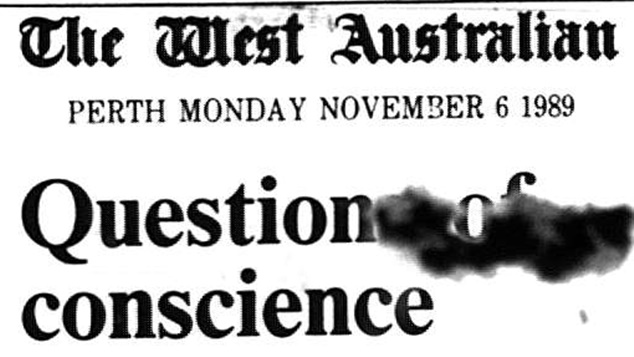Why The West apology is 32 years late
OPINION: Brian Greig
In 1989, the West Australian government tried to decriminalise homosexuality. It had been 100 years since Oscar Wilde had been jailed under similar laws in the UK, but the imported anti-sodomy statutes from colonial times lived on here.
All consenting sex between males was a criminal offence. The penalty was 14 years in prison; with or without whipping. The Dowding Labor government sought to repeal the law and introduce an age of consent at 18. Still discriminatory (heterosexual sex was 16), but it was felt this was needed to get the Bill through the conservative upper house.
It had been many years since anyone was convicted under this law, but its existence had repercussions. It set a tone. It condemned gay men to live under fear. It deemed all LGBT people as a threat and danger. People lost jobs. It prevented the introduction of anti-discriminations laws and stymied HIV-AIDS prevention measures at the height of the pandemic.
The law reform campaign had been bitter and brutal. It had raged in the media for several weeks. The letters pages and talk-back radio overflowed with homophobic hate. The religious conservatives whipped up fears about AIDS, paedophilia and “teaching homosexuality in schools.”
On Monday 6 November 1989, after weeks of debate, the Bill was expected to pass the upper house with amendments. That morning, The West Australian Newspaper ran an editorial to oppose it.
It remains the most homophobic editorial I have ever read. It so shocked staff at The West a meeting was held to discuss it and complain to management. Journalist Janine Cohen, a member of the Gay Law Reform Group of WA, resigned from the paper.
The editorial Questions on Conscience, opined that supporting the Bill was “an easy option” that people were following in order to “spare us from accusations of repression and from the shrill indignation of the ‘gay’ lobby.”
It went on, “While no community can ever hope to stamp out homosexuality, it remains a supremely unacceptable aberration with an unhappy capacity to corrupt, and deserves no concessions.”
It further denounced the “ugly face of homosexuality” (“depraved encounters in public toilets, and the profligacy of ‘so-called gay Mardi Gras’”), and noted that monogamous couples should “conduct their relationships discreetly.”
“If the Bill succeeds it will set a new benchmark by which future moral questions will be decided. If ‘conscience’ is literally to be what decides its fate, it should fail.”
Over the last three decades, The West has never apologised. Despite this, it now falls over itself to “proudly” sponsor the Pride Festival, which is seemingly no longer part of “the ugly face of homosexuality.” It’s distaste over the “profligacy of ‘so-called gay Mardi Gras’” has been replaced with official endorsements for it.

Enough is enough. If The West cannot or will not offer a full public apology for its past condemnation of LGBT people and its opposition to our equality, then it should be denied access to Pride support.
It should not be acceptable that corporations which are keen to brand with us when it suits them are not also held accountable for their actions.
The current staff and management at The West are not responsible for an editorial position from 32 years ago, but they are responsible for honesty, transparency and reconciliation.
They are also responsible for the fact that just four years ago when every major paper in the country editorialised in favour of marriage equality, The West did not. It sat on the fence and stayed silent.
The more important point here is that since the marriage equality campaign of the last ten years, businesses have been rushing forward with money, sponsorship and branding opportunities to align themselves with LGBTI equality.
As a community we must be more discerning. It’s not enough just to host a talk during Pride, print a glossy brochure or enter a float in the parade as an illustration of “proud support.” Support must include advocacy outside of Pride Month. Organisations and companies must demonstrate how their internal structures address prejudice; include LGBTI people and right historical wrongs.
I invite The West Australian Newspaper to set the example here.
Brian Greig was a member of the Gay Law Reform Group in 1989.

The West Australian’s editor Anthony De Ceglie responds
OUTinPerth approached The West Australian and Pride WA to ask if the newspaper would consider making a formal statement apologising for the 1989 editorial.
We first approached them in 2019 ahead of the 30th anniversary of the editorial’s publication, and made a second approach after the issue was raised at a Pride event involving older community members in 2020. In 2021 the newspaper has addressed the historical column for the first time.
Anthony De Ceglie, Editor in Chief at The West provided the following response.
“This editorial from 32 years ago is another reminder of how far we have come as a newspaper and as a community”
“The West Australian was under different ownership in 1989, and the hateful language and sentiment of this editorial certainly does not reflect our company’s culture or values under my watch.
Seven West Media (WA) is an inclusive workplace, a proud partner of Pride WA and a passionate supporter of the LGBTIQA+ community.” Anthony De Ceglie, Editor in Chief The West Australian.
This post was first published in 2021.
You can support our work by subscribing to our Patreon
or contributing to our GoFundMe campaign.








